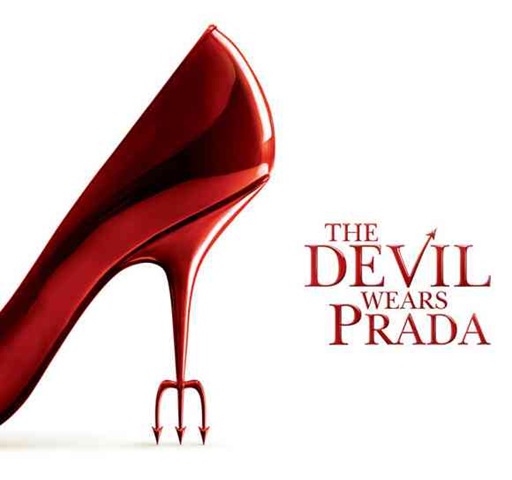
Reading The Devil Wears Prada has become something of a yearly ritual for me. Like tree-trimming, eggnog and the post-Christmas-dinner Feist Family drunken Irish brawl, Prada has become closely linked to the holiday season, a sort of kick-off to Christianity's knock-off of the Winter Solstice. Needless to say, I've read through the book so many fucking times I could write a Master's Thesis on the BDSM undertones in the relationship between main character Andrea Sachs and her employer/Machiavellian overlord Miranda Priestly, but that's a post for another time.
Despite the previous gushing paragraph, the thin-to-the-point-of-nonexistence plot follows the standard "Corruption and Salvation of the Protagonist" mold:
The plot of Prada is really it's weakest point. While it manages to follow the standard paint-by-numbers cliche of tell-all novels in order to avoid turning-off potential readers, you can't help but feel as if it didn't so much take a backseat as it was left on the side of the road. At one point in the story, Andrea recounts about how Miranda's signature style of scarves were discontinued a year before she arrived, only to contradict herself a couple sentences later by saying that she bought the remaining stock two years before the events of the story. I wouldn't mind it so much if it weren't for the fact that the contradictory statement takes place TWO SENTENCES after the first. I'm not sure if this Weisberger's lack of attention to details or a supremely lazy editor but it just highlights the fact that she could have spent just a tiny bit more effort on the plot as a whole.
Thankfully, Prada's saving grace is Lauren Weisberger's impeccable characterization skills. Maybe it was the fact that most of the characters were based on real people, but it's amazing to see a book where even secondary characters are this fully-realized. The crowning glory of it all is obviously Miranda Priestly, the thinly-veiled stand in for A-List Sociopath Anna Wintour. While Streep's version in the adaptation was a more relatable figure, Weisberger's original is an absolute force of nature. She's merciless, cruel, vindictive and volatile at the drop of a hat, but you can't help but want to please her. She's a woman without a single redeeming quality or even so much as a trace of humanity underneath the flawlessly polished veneer, yet you can't help but want to please her for the sole reason that she cannot be pleased. The more vile and contemptuous she becomes, the more you want Andrea to succeed, partly to rub it in her face and partly because...Well, you want to give her exactly what she wants. She's a whip-cracking dominatrix who, lacking social intricacies or meaningful interaction, will break you not because she wants to, but because she has to: if she doesn't, you'll leave her.
Granted, it's easy to fall for the villain; they're usually the most-complex and human characters. However, Andrea is really what holds it together. Fiction hinges on the concept of suspension of disbelief, and when you live in a world where choosing between a Marc Jacobs Peacoat or a wrap from Givenchy is a life-or-death decision, you're going to need it. That's where Andrea comes in. I don't know how she does it, but Weisberger wrote her protagonist in such a way that, while you don't necessarily agree with everything she does, you can understand her decision. You can understand the panic when she hears the phone ringing, the sense of urgency in finding the number for Karl Lagerfield, and the frustration from being unable to instill the importance of these in everyone around her. She's a remarkably sympathetic character overshadowed only by one of the most wickedly malicious antagonists ever put to print.
At the risk of sounding long-winded, here's the shortened version: The plot is about as cliche and two-dimensional as you can get without breaking out the crayons, but the depth and complexities of the characters more than makes up for the fact. If you can get past the much-hyped real life implications of the story, it's a surprisingly deep book for something that most would describe as a guilty pleasure.





No comments:
Post a Comment